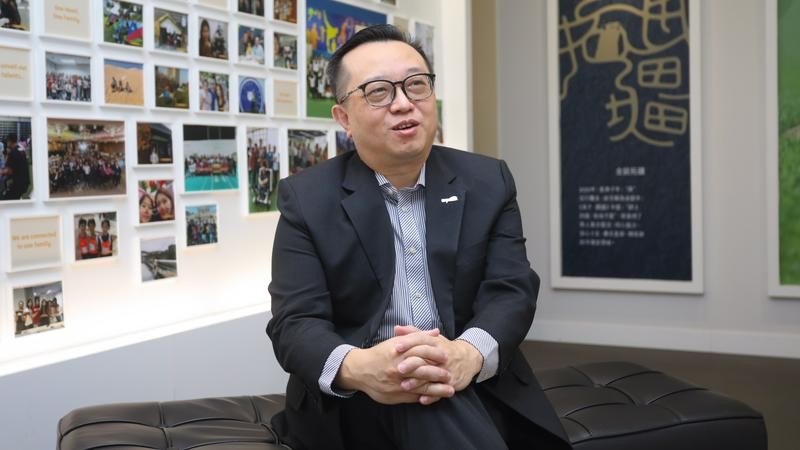2020-11-18
Eleanor Huang

Long before Tony Tsang became the chief executive officer of DYXnet Group, a 500-strong Hong Kong carrier-neutral network service provider, the economics and marketing major at the University of Hong Kong developed a special interest in information technology and the vast internet world. In the 1990s, Tsang’s global vision led him to California. “At that time, it was everyone’s dream to go to Silicon Valley and get a taste of its innovative atmosphere, so I chose to work over there for a few years,” he said. He worked at a startup until the watershed year of 2000, when the then-chief technical officer of WebEx, Zhu Min, asked him to blaze new trails for the US web conferencing provider in the Chinese mainland market. Zhu told him: “Tony, it is better for you to bring that experience and your strengths back to Hong Kong and the mainland, and try to help the company really grow there.” It was not an easy decision. Tsang said he weighed all the “push and pull factors”. The technology infrastructure in Hong Kong was not mature then. “Twenty to 30 years ago, Hong Kong companies still relied on modems to connect to the internet, and even the use of the internet was not very popular,” he said. Homeward trek But after considering the promising business prospects in the mainland market, Tsang decided that his home city would be the best platform to capitalize on his strengths. He then took a leap of faith and left Silicon Valley for Hong Kong. Little did Tsang know this would be the foundation for a fruitful career in the Asian telecommunication industry He recalled the management practice in Silicon Valley was fast-paced and flexible, where everyone adopted an experimental mindset and everything was tested rapidly. “They try one thing. If it works, it would be the focus on that day. If it doesn’t work, they will change their project,” Tsang said. “Because they were the newcomers in the market, they had to work against the incumbent.” This contrasts with Hong Kong and mainland companies, most of which tend to play safe and execute project plans with clear objectives and direction, Tsang said. “In this way, the risk is relatively low, but they may also miss out on potentially high returns.” In Hong Kong, Tsang takes a leaf out of the Silicon Valley technology companies’ playbook. He encourages his team to freely express their opinions. “I like to work with young people because they are really thinking out of the box and more courageous to talk about new things.” Tsang sees China as a fertile breeding ground for innovation. He has high hopes for the Guangdong-Hong Kong-Macao Greater Bay Area, saying it has the potential to surpass Silicon Valley in the near future. When he was working in Silicon Valley, Tsang said, the business landscape was quite homogenous, with many companies focused on software and digital applications. The Bay Area in southern China boasts a diverse innovation landscape with myriad resources. There are traditional hardware-centric, manufacturing-based cities like Shenzhen and Dongguan, he said. “In terms of labor, the Bay Area has a larger population, and the production cost is much more competitive.” Each city in the Bay Area has its own distinctive flair, and Hong Kong can position itself as the region’s “testing center”, Tsang said. Thirst for exposure Hong Kong’s fast, stable and widespread broadband coverage allows data-rich applications to run on the ground. “We can test the mainland’s new applications, such as internet of things and big data, which require low latency and high bandwidth, and then have them deployed on the mainland,” he said. Tsang said Hong Kong, a renowned international financial center, has the potential to be the leading fintech hub in the Bay Area. “Hong Kong people are well-known for their adaptability,” he said, adding that the city’s participation will help to create a bigger economic pie in the Bay Area. Looking back on his career, Tsang said the key ingredient that drove him toward his accomplishments was a thirst for “life exposure”. In 2000, when Tsang first set up a WebEx office in Hong Kong, he was responsible for a wide spectrum of work - hiring; liaising with marketing agencies, legal practitioners and airline companies; and signing contracts with clients. He didn’t expect this to happen when he was a fresh university graduate. Tsang’s first job was as a sales and marketing trainee at a telecom company, and he thought his career path would lead him to sales positions. “Never limit yourself. Try different things”, because after going through these trials, you will find your strengths and your true passion, he said. “You might not be able to identify something very concrete, but these experiences expose you to a wide spectrum of significant aspects of work,” he added, as a tip for young people yearning to start their own business ventures.